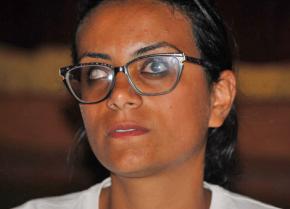A shield for the marginalized
is a member of Egypt's Revolutionary Socialists who was convicted and sent to prison for violating the military regime's ban on political protests. She and eight others were convicted for demonstrating outside an Alexandria courthouse in December 2013 to draw attention to the retrial of police officers who murdered political blogger Khaled Mohamed Said. Earlier this year, she served four months of a six month sentence, but was released after a campaign mobilized support for her.
On November 19, Mahienour and four others were arrested in Alexandria after a protest. The five were questioned by state security officer about the demonstration and who organized it, though they were eventually let go without being charged. The arrest is an indication that the Egyptian state still has Mahienour in its sights.
Here, we print Mahienour's acceptance speech after winning the Ludovic Trarieux Award, which is given annually to a lawyer for their contribution to the defense of human rights.
DEAR JUSTICE servants and human rights defenders:
Today, I am with you in person, though that initially was not going to happen as I was imprisoned in the jails of Field Marshall el-Sisi, like more than other 41,000 political detainees. I was charged along with eight others--four of them are still in prison serving two years. I was also sentenced to two years, to be reduced at the appeal and to be suspended because of your solidarity. I was luckier than the other thousands who didn't receive as much attention.
I was astonished when I found that I received your prestigious award. At that time, I was in prison, deprived of all kinds of communication with the outside world. I really don't feel that I deserve such an honor as, all the time, I was part of a bigger group, starting with being a member of the Revolutionary Socialists. I was also a volunteer lawyer at the Alexandria protesters' Defense Front, and a member of No to Military Trials for Civilians and the Refugees' Solidarity Movement. But above all, I was one of millions of Egyptians who had dreamed of justice and made a revolution that toppled two dictators--and we are crossing our fingers that it will topple the third.

I call what happened on July 3, 2013, a coup--not because el-Sisi, the head of the counter-revolution, toppled another dictator, but because he manipulated the masses. I think that he should be considered a war criminal, as he was the head of the military intelligence that gave the pretext for the "virginity tests" that happened to female protesters in March 2011. He was the defense minister during the time of former President Mohamed Morsi, who killed many Egyptians in the city of Port Said. After el-Sisi overthrew Morsi, he carried out one of the biggest massacres of the new century--the Rabaa massacre, which killed more than 1,000 people. Now there is a crackdown leading to the imprisonment of thousands, and even driving people from their houses and demolishing them in Sinai under the slogan of the "war against terrorism." In such a situation, where a dictator is building up his powers, one of his most important enemies are human rights defenders, and especially lawyers.
Being a lawyer opens your eyes to the amount of injustice in society. Lawyers have to choose whether they want to serve justice or serve the law, even if it is against the people's interests, as "law" is an abstract word. For me, "law" is the law of the ruling class, and in countries like Egypt, where autocracy and tyranny are at their heights, you will find laws issued to silence the people or to steal their rights. Yet lawyers have a great role in raising awareness and in being a shield for the marginalized and a voice for the voiceless.
Finally, I want to dedicate the award to Omar, Loay, Islam and Nasser, the four people who were with me in the case, but who are still in prison; to Sanaa Seif, Yara Sallam and the protesters from the Ithadia case; to Mohamed Hissny, Alaa Abdelfattah and Shura, protesters in prison now; to Mahmoud Nasr and Al Jazeera English reporters imprisoned in Egypt; to Mohamed Sultan and Ibrahim el-Yamany, who will be entering the 300th day of their hunger strikes; to the rest of the 41,000 detainees; to the Palestinian people who taught us how to resist and have hope in the future; to the people of Kobanê who are fighting extremists; to the Iranian girl Rihana Gebari, who was sentenced to death because she killed her rapist to defend herself. To all those brave souls and human beings, I dedicate such award.
Thank you so much, and I hope that we as lawyers will be helping to build a better world and more humane societies.
First published at the Revolutionary Socialists website.


